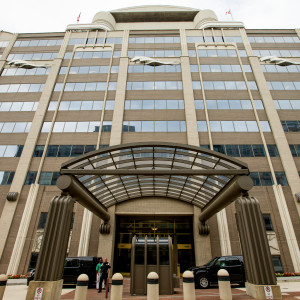Update: Story updated to clarify definition of payment and enforcement action.
The Federal Communications Commission’s Enforcement Bureau finalized a $2 million settlement with a wireless provider of the agency’s Lifeline phone subsidy program Friday for falsely claiming an additional $25 meant for low-income subscribers living on tribal lands.
The agency’s Enforcement Bureau said it reached a settlement with Texas-based Blue Jay Wireless for $2,002,000 the provider must return to the Universal Service Fund for subscribers who claimed to live on tribal lands in Hawaii. Blue Jay claimed the extra subsidies without first verifying subscribers actually lived there.
Subscribers living on those lands can receive up to $25 over the standard $9.25 monthly subsidy if they live in tribal areas, which typically have lower employment and income than other rural areas in the U.S. The Lifeline program is funded by the FCC’s Universal Service Fund, paid for via a monthly fee on the average American consumer’s phone bill.
“The Lifeline program is vital to millions of consumers in cities, rural areas, and tribal lands who rely upon it every day to connect with loved ones, interview for jobs, and contact emergency services,” Enforcement Bureau Chief Travis LeBlanc said in an agency statement Friday. “This settlement makes clear that no Lifeline provider should turn a blind eye to potential fraud on the program.”
According to the FCC, Blue Jay claimed extra subsidies for several thousand Hawaiian customers supposedly living on Hawaiian Home Lands — considered tribal lands under the agency’s rules — until 2014, when the Hawaii Public Utilities Commission told Blue Jay they appeared to be claiming more enrollees than actual households residing on Hawaiian Home Lands.
Despite finding it could be “improperly claiming” the enhanced compensation, Blue Jay continued to collect the additional subsidy “while it sought to gather more accurate information.”
The $2 million settlement includes Blue Jay’s forfeiture of $918,010 in Lifeline disbursements that the FCC has already frozen. As part of the settlement Blue Jay will implement software to verify consumers self-certification that they live on tribal lands. Blue Jay is eligible to offer Lifeline subsidies in 17 other states including Puerto Rico.
Friday’s enforcement action is the second levied against a Lifeline provider this year — the first in April being the largest fine the agency has ever issued against a provider for enrollment fraud.
It also comes amid an ongoing investigation into Lifeline fraud by Republican FCC Commissioner Ajit Pai, who recently found a pattern among multiple Lifeline providers across the U.S. enrolling subscribers after they’re flagged as a possible duplicate by a database providers ping before subscribing a customer.
Providers can override the duplicate enrollments without submitting any explanatory documentation to the FCC, and in the case of rural or tribal addresses, simply by pressing a button.
Such enrollments accounted for one-third of all enrollments — 4,291,647 people — between October 2014 and April 2016, or 35.3 percent.
Pai confirmed Friday Blue Jay is one of the providers his office is investigating.
“Today’s consent decree with Blue Jay Wireless for improperly receiving Lifeline subsidies confirms that the FCC’s Lifeline program still contains waste, fraud, and abuse,” Pai said in a statement Friday. “I can confirm that Blue Jay Wireless is one target of my ongoing investigation and that I flagged further suspicious conduct for the Enforcement Bureau’s investigation earlier this year.”
Pai previously singled out Oklahoma as one of the costliest states to Lifeline as a result of the enhanced tribal subsidy provision. In Oklahoma’s tribal lands, Lifeline subscribers are eligible for the max $34.25 monthly subsidy whether they are Native Americans or not. In 2014, Oklahoma cost the Lifeline program the second highest total — $128 million — despite the state ranking 28th in population. The vast majority of Oklahoma’s claimants — 99.5 percent — received the higher $34.25 subsidy.
“I will continue to work with my colleagues, the Enforcement Bureau, the Inspector General, and the Universal Service Administrative Company to end the abuse of taxpayer money by unscrupulous wireless resellers,” Pai said Friday.
The subject of Pai’s investigation came up during an FCC oversight hearing on Capitol Hill Tuesday, where Democrats pressed the Republican Commissioner on whether he’d uncovered any hard evidence of fraud in the program yet.
While he conceded he hadn’t, Pai said the high number of Lifeline subscribers enrolled via overrides — roughly 48 percent of the total number of enrollments — represented potential fraud the commission should investigate.
Democrats, who recently compiled their own report on duplicate enrollments, helped along by FCC Chairman Tom Wheeler, said the numbers were accurate based on U.S. Census Bureau data on the number of doubled-up households in the U.S., such as homeless shelters.
Following the FCC’s open meeting Thursday, Pai said House Democrats’ report only examined one of the five forms of potential fraud his office is investigating with data provided by the Universal Service Administrative Company (USAC), charged with administering Lifeline.
Pai said he was expecting more data from USAC requested as part of the investigation as early as this week.

